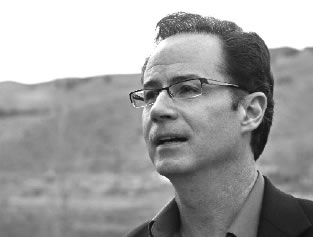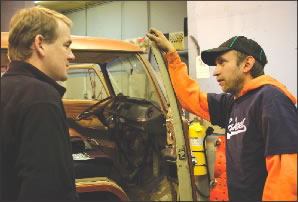By Jennifer Dempsey
Brock Oyler has always wanted to help the world.
“As funny as it might sound, I knew when I was about 5 or 6 years old that I wanted to help change the world,” said the 50 year-old?Salida native and founder of The Convergence Project (TCP). “After I got out of the bath tub one day, a day that I still remember vividly, I told my mother, ‘I need to do something great someday.’ She never stopped reminding me of that, and I wish she were here to see The Convergence Project today.”

Founded in 2008, The Convergence Project is an international 501 (c) (3) non-profit organization that brings dissimilar groups together to identify and complete common ground projects that benefit the greater community in which they are based. Based in Salida, TCP facilitates projects throughout the state, the US, and has recently expanded to other countries around the world.
“I became inspired to start TCP when it became apparent to me that many groups spend as much time working against another group as they do working for what they believe in,” he said. “This seems like an utter waste of time. We are always stronger if we could find the common ground to work together.”
Holding a Masters degree in Organizational Communication from Purdue University and a B.A. in Interpersonal Communication from the University of Colorado at Boulder, Oyler has spent more than 20 years working in the area of conflict resolution and has discovered techniques that work and that don’t.
“I didn’t want to create an organization that called for a giving up of beliefs or values because no one really wants to do that,” he said. “And the long-term results of agreements based on compromise can be limited.”
So, Oyler created “The Converged Path,” a step by step process?that helps two dissimilar groups find areas of existing agreement or common ground. Trained leaders known as Path Guides facilitate the process. Each group identifies their beliefs, fears, and hopes and listens to those same issues from the other group. From this process, a common ground – an area in which the groups already agree – emerges. Once the common ground is established, an action plan is created.
“It is in every sense of the word a win/win situation,” he said. “Groups are usually surprised when they find they can work with a group they think of as adversarial while at the same time meeting more of their own objectives.”
Last fall, The Convergence Project brought together the Central Colorado Humanists, a non faith-based group with members of the faith-based community in Salida. Through the Converged Path process, the two groups identified a common ground action plan – painting the Salida Senior Center.
“I enjoyed working on the Salida Senior Center Painting project,” said Ray Steffa, member of?Central Colorado Humanists. “It’s always a pleasant experience to work with good people. Anyone volunteering to help somebody else is, by my definition, a good person.”
Kathy Fogel from the First Presbyterian Church said,?“Participating in (this project) gave me the opportunity to meet different people who have diverse opinions. The Convergence Projects worked on are valuable to the community, and besides, it’s a lot of fun!”
Oyler said even the most seemingly dissimilar groups have found common ground projects that benefit their community. Whether they are pro-choice or pro-life groups, environmentalists, ATV enthusiasts, or a private school or public school, groups have found ways to join efforts to work on projects that improve their community. Some of these projects have focused on helping schools, supporting youth activities, benefiting the elderly and economically disadvantaged and supporting the local economy.
“We have found that by the time they sit down at the table, people have made up their minds that they want to do this,” he said. “It is as if they want it to work and are tired of the way things have been.”
TCP currently has 18 Path Guides and 20 projects in progress. Since its inception, TCP has focused its work in Colorado but in 2009 TCP was ready to expand to other states and the world at large, Oyler said.
“For the first year TCP was in existence, we tested the model here in Colorado, knowing that if it worked here, it could probably work anywhere,” he said. “Using a variety of methods to connect with volunteers across the country and around the world, we began to put our message out there. I now hear from volunteers almost daily who are thrilled about our message and want to help.”
This July, TCP is supporting an exchange trip to Salida by an organization that works with bereaved families in Northern Ireland. Widows Against Violence (WAVE) offers counseling services to all members of the community who have lost loved ones in the violent troubles. Catholics, Protestants, civilians, and military families come together with common vision of healing and putting an end to violence.
“We are partnering with the Salida Circus Outreach Foundation who are hosting 10 children for a circus exchange trip,” Oyler said. “In the WAVE organization, people from different religions and political persuasions are putting their differences aside to bond together to help each other heal and grieve. The children in WAVE are brought together by the joy of being the circus. We are very honored to be part of this project.”
Oyler is also inspired about a project in Colorado Springs in which TCP is partnering groups of gay, lesbian, bisexual, and transgendered individuals with evangelical Christians. “The divisiveness between these groups has received national attention for years, and to be leading a process that might begin to close some of these wounds is really exciting,” Oyler said.
All TCP projects are funded by donations from individuals or organizations. For more information on how to become a Path Guide or how to set up a TCP project in your area, visit:
www.theconvergenceproject.org or call 719.239.0971


